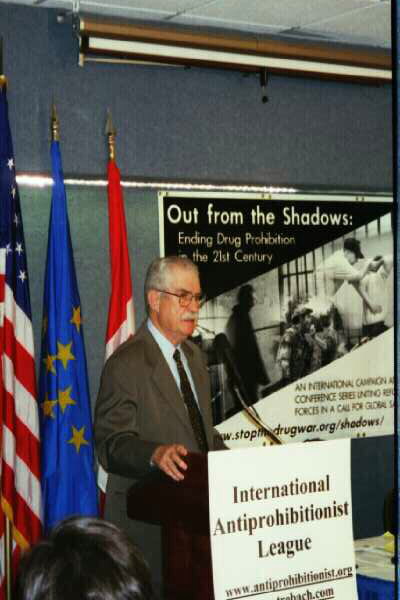DRCNet
Book
Review:
"The
Great
Drug
War:
And
Rational
Proposals
to
Turn
the
Tide,"
(2nd
edition),
by
Arnold
Trebach
(Unlimited
Publishing,
401
pp,
$19.99
pb.)
11/4/05
by Phillip S. Smith, [email protected], 11/4/05 I read "The Great Drug War" by drug reform progenitor Arnold Trebach when it was first published in 1987. The hard cover first edition still sits in a place of honor on my drug policy bookshelves. But my first reaction upon being asked to review this edition of "The Great Drug War" was to ask myself what could possibly be relevant in a tome written in the dark ages of the last century, with the only addition to this edition being a new introduction. Surely the book could only be read for its historical significance. If only that were the case. Sadly, "The Great Drug War" remains screamingly relevant, and many of the stories Trebach tells could be ripped from today's headlines. Just substitute "meth" every time you read "crack," and you'll get my drift.
Two decades ago, in what was a heartfelt indictment of the Reagan-era war on drugs, Trebach identified and brought to vivid life all sorts of abuses derived from the effort to enforce drug prohibition and began to elaborate a strategy for escaping from drug war and achieving "drug peace." But in the intervening years, while progress has come on some fronts, "drug peace" seems even more distant and the drug warriors appear even more entrenched than during the "Just Say No" era. More than 20 million people have been arrested on drug charges in the US since Trebach put pen to paper back in the mid-1980s (when people actually put pen to paper). An observer from that period -- a time of hysteria over crack cocaine and relentless calls for more, tougher drug laws -- would be mind-boggled to see that the number of people imprisoned on drug charges has more than quadrupled since then. The drug war juggernaut continues to roll, crushing countless Americans beneath its mindless wheels and inflicting US-style prohibitionism on the rest of the world with equally nefarious results. Which is not to say there has been no progress. A drug reform movement that barely existed in 1987 has now blossomed and matured and shows signs of being able to influence policy, at least at the margins. Trebach and his early work are a big reason for that. Trebach himself has progressed. In "The Great Drug War," Trebach took pains to note "I never said we should legalize heroin and all other drugs." In the new edition, he points out that he has since become a legalizer, in no small part because of the research he did for the original edition. But for every change for the better in drug policy for the past two decades, it seems as if there must be a change for the worse. In "The Great Drug War," Trebach exposed the abuses and brutality of teen "drug treatment" programs like Straight, Inc., whose techniques were more akin to brainwashing than therapy. Well, Straight, Inc. has been run out of business. That's the good news. And the people responsible were punished, right? Wrong. Mel Sembler, the Florida-based founder of Straight, Inc. and continuing member of the Florida drug war firm, never went to prison. Instead, he is now ambassador to Italy under the Bush administration. In "The Great Drug War," Trebach described the low-level war between California marijuana growers and the police dedicated to wiping out their crops. That war continues. Just last week, California law enforcement authorities proudly announced they had eradicated a record-breaking million marijuana plants in the annual game of cat-and-mouse with growers. And just last month, the Bureau of Justice Statistics announced that marijuana arrests were at an all-time high -- again. In "The Great Drug War," Trebach warned of the corruption and perversion of police engendered by attempting to enforce the prohibition of widely desired substances. Two decades later, the major scandals are too numerous to count, and mundane drug war corruption is so commonplace the Drug War Chronicle runs a weekly recap. In "The Great Drug War," Trebach very presciently decried the specter of intrusive drug testing and the totalitarian impulse behind it. In a year where Congress is hauling professional athletes before it and demanding that the professional sports leagues institute tough drug testing policies -- or else -- Trebach's drug testing chapter subhead "Testing Sports Stars: Why?" seems ripped right off the front pages. In "The Great Drug War," Trebach took some pioneering steps in de-demonizing drug users and suggested we treat drug users not as criminals but as potential nice neighbors. In that section of his book, Trebach told the story of Kenny Freeman, "the nice neighbor junkie." Freeman is no longer Trebach's neighbor, but I am happy to report that when I last saw him a year ago in his Baltimore apartment, he was alive and well -- and still a junkie. And, yes, still a nice neighbor. Nearly two decades ago, Trebach was writing about the saddest victims of the drug war, chronic pain patients. There has been progress on this front, especially with the advance of medical marijuana in the states. But at the same time, the number of Americans suffering from chronic pain has climbed to more than 50 million while the drug czar has declared war on prescription drug abuse and "pill-pushing Dr. Feelgoods." Now, patients suffer because doctors fear the wrath of the drug warriors. "The Great Drug War" remains invaluable reading, not just for historical perspective -- which is fascinating and depressing enough -- but for its keen analysis of the dynamics of prohibition that are still at work and, in some cases, more entrenched than they were two decades ago.
|

